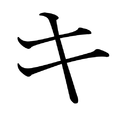Ki (Kana)
| Hiragana | Katakana | ||||||||||||||||||||||||||||||||||||||||||||||||||||||||||||||||||||||||
|---|---|---|---|---|---|---|---|---|---|---|---|---|---|---|---|---|---|---|---|---|---|---|---|---|---|---|---|---|---|---|---|---|---|---|---|---|---|---|---|---|---|---|---|---|---|---|---|---|---|---|---|---|---|---|---|---|---|---|---|---|---|---|---|---|---|---|---|---|---|---|---|---|---|

|

|
||||||||||||||||||||||||||||||||||||||||||||||||||||||||||||||||||||||||
| Stroke order | |||||||||||||||||||||||||||||||||||||||||||||||||||||||||||||||||||||||||
|
|
|
||||||||||||||||||||||||||||||||||||||||||||||||||||||||||||||||||||||||
| Unicode | |||||||||||||||||||||||||||||||||||||||||||||||||||||||||||||||||||||||||
| U + 304D | U + 30AD | ||||||||||||||||||||||||||||||||||||||||||||||||||||||||||||||||||||||||
| origin | |||||||||||||||||||||||||||||||||||||||||||||||||||||||||||||||||||||||||
| 幾 | 幾 | ||||||||||||||||||||||||||||||||||||||||||||||||||||||||||||||||||||||||
| Transliteration | |||||||||||||||||||||||||||||||||||||||||||||||||||||||||||||||||||||||||
| Kunrei : | ki | ||||||||||||||||||||||||||||||||||||||||||||||||||||||||||||||||||||||||
| Hepburn : | ki | ||||||||||||||||||||||||||||||||||||||||||||||||||||||||||||||||||||||||
| 50 sounds board | |||||||||||||||||||||||||||||||||||||||||||||||||||||||||||||||||||||||||
|
|||||||||||||||||||||||||||||||||||||||||||||||||||||||||||||||||||||||||
き , in Hiragana , or キ in Katakana , are Japanese characters of the Kana system , both of which represent a Mora . In modern Japanese alphabetical sorting , they are in seventh position. The き is also the 38th letter in the Iroha , directly after the さ and before ゆ . The form of both kana is derived from the kanji 幾 and both represent [ki] .
| shape | Rōmaji | Hiragana | Katakana |
|---|---|---|---|
| Normal k- (か 行ka-gyō ) |
ki | き | キ |
|
kii kī |
き い き ー |
キ イ キ ー |
|
| Additional Dakuten g- (が 行ga-gyō ) |
gi | ぎ | ギ |
|
gii gī |
ぎ い ぎ ー |
ギ イ ギ ー |
variants
The Kana can be expanded with the Dakuten , to ぎ in Hiragana, ギ in Katakana, and thus gi in the Hepburn system .
Stroke order
Other forms of representation
- In Japanese Braille :
- The Wabun code is - ・ - ・ ・.
- In the Japanese spelling table it is spelled as "切 手 の キ" (Kitte no Ki).
Web links
Wiktionary: き - Explanations of meanings, word origins, synonyms, translations



